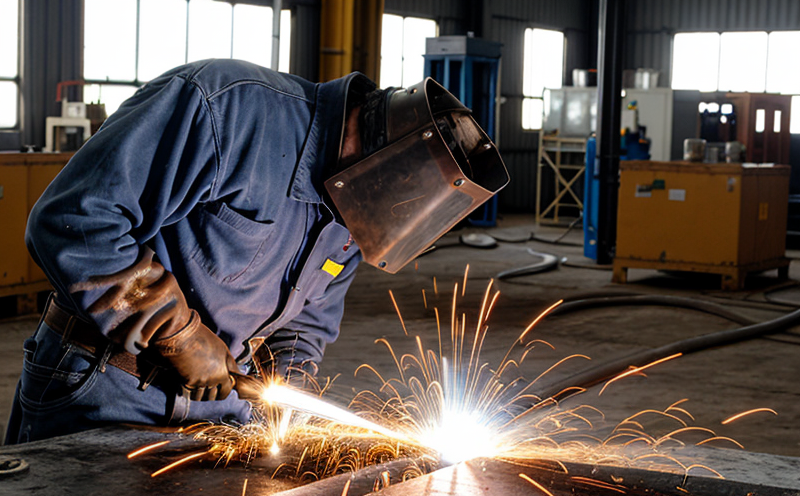ASTM A370 Mechanical Testing of Welded Steel Joints
The ASTM A370 standard is a cornerstone in the mechanical testing of welded steel joints. This service ensures that the integrity and strength of welds are thoroughly evaluated, making it indispensable for industries reliant on structural reliability. The ASTM A370 protocol involves several specific tensile tests designed to determine the minimum yield point, specified extension after fracture (Agt), elongation at break (%E), and reduction in area (RA).
The testing process begins with meticulous specimen preparation. According to ASTM A370, the specimens must be machined from the weld metal, heat-affected zone (HAZ), and parent metal to ensure a representative sample of the welded joint. The mechanical properties are then measured under controlled conditions using tensile testers that comply with relevant standards like ISO 6892:1998 for tension testing.
The importance of ASTM A370 cannot be overstated, especially in sectors where structural integrity is paramount such as automotive, aerospace, and construction. The results from this test are critical for ensuring compliance with industry codes and standards, including ASME (American Society of Mechanical Engineers) and EN 15085.
The ASTM A370 service not only provides data on the mechanical properties but also aids in identifying potential weaknesses or inconsistencies within the weld. By using this standardized approach, quality managers can make informed decisions that enhance product reliability and safety.
Why It Matters
The ASTM A370 Mechanical Testing of Welded Steel Joints is essential for ensuring that welded joints meet critical performance requirements in various applications. By measuring the tensile properties, this service helps identify any potential issues with the weld quality and ensures adherence to strict industry standards.
- Ensures compliance with ASME Section VIII Division 1 and EN 15085
- Aids in the identification of potential weaknesses or inconsistencies within the weld
- Provides data on mechanical properties that are critical for product reliability and safety
- Serves as a quality control measure, ensuring that welding processes meet specified standards
The importance of ASTM A370 cannot be overstated in sectors where structural integrity is crucial. The results from this test play a pivotal role in enhancing the performance and longevity of welded structures.
Industry Applications
| Industry Sector | Application |
|---|---|
| Aerospace | Ensuring the reliability of critical structural components |
| Automotive | Evaluating the strength of vehicle frames and chassis |
| Bridges & Infrastructure | Verifying the durability and safety of major infrastructure projects |
| Offshore Oil & Gas | Maintaining pipeline integrity for safe operations |
| Application | Material Type |
|---|---|
| Evaluating the strength of welded joints in structural applications | Carbon steel, stainless steel, and other high-strength alloys |
| Verifying compliance with ASME Section VIII Division 1 | AISI/SAE grades such as 4130, 4140, or duplex stainless steels |
| Maintaining pipeline integrity for safe operations in the offshore oil and gas sector | Welded joints made from materials like X60, X70, or X80 |
The ASTM A370 service is widely used across various industries to ensure that welded steel joints meet stringent requirements for mechanical properties. This service plays a crucial role in maintaining the safety and integrity of structures and components in sectors where reliability is non-negotiable.
Quality and Reliability Assurance
- Tensile tests are conducted on specimens that represent the welded joint's material properties
- The results ensure compliance with industry standards such as ASME Section VIII Division 1, EN 15085, and ISO 6892:1998
- Testing helps in identifying potential weaknesses or inconsistencies within the weld
- The data from these tests are used to improve welding processes and enhance product reliability
The ASTM A370 service is a vital component of quality assurance programs. By providing accurate and reliable data on the mechanical properties of welded steel joints, this service helps in maintaining high standards of quality across various industries.





